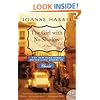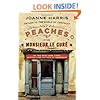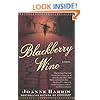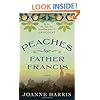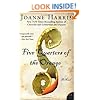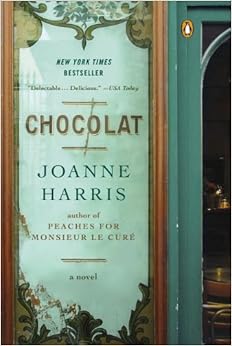



Chocolat Paperback – January 1, 2000

Don't have a Kindle? Get your Kindle here, or download a FREE Kindle Reading App.
Product Details
Would you like to update product info or give feedback on images?.
|
Editorial Reviews
Amazon.com Review
One by one the locals succumb to Vianne's concoctions. Joanne Harris weaves their secrets and troubles, their loves and desires, into her third novel, with the lightest touch. There's sad, polite Guillame and his dying dog; thieving, beaten-up Joséphine Muscat; schoolchildren who declare it "hypercool" when Vianne says they can help eat the window display--a gingerbread house complete with witch. And there's Armande, still vigorous in her 80s, who can see Anouk's "imaginary" rabbit, Pantoufle, and recognizes Vianne for who she really is. However, certain villagers--including Armande's snobby daughter and Joséphine's violent husband--side with Reynaud. So when Vianne announces a Grand Festival of Chocolate commencing Easter Sunday, it's all-out war: war between church and chocolate, between good and evil, between love and dogma.
Reminiscent of Herman Hesse's short story "Augustus," Chocolat is an utterly delicious novel, coated in the gentlest of magic, which proves--indisputably and without preaching--that soft centers are best. --Lisa Gee, Amazon.co.uk --This text refers to an out of print or unavailable edition of this title.
From Publishers Weekly
Copyright 1998 Reed Business Information, Inc. --This text refers to an out of print or unavailable edition of this title.
More About the Author
Customer Reviews
Most Helpful Customer Reviews
The story takes place between Ash Wednesday and Easter and delightfully portrays true kindness and charity by using the symbolism surrounding the sweetness and comfort of chocolate. The local priest and his "groupies" distrust the new young woman who has come to their sleepy town and opened the small, warm, inviting chocolate shop just acros from his church. Chocolate represents for them decadence and evil - where for the townsfolk, it opens their eyes to lifes' joy they have been missing. As Easter - and a Chocolate Festival - approach, the "penitent" feel they must stop the festival - but we find that the forty days of Lent have taught this little town the true meanings of Christianity. Wonderfully seen from two points of view - one accepting and open, the other skeptical and closed-minded, the books' characters blossom as they stop in at the little chocolate shop. It's a story of winter turning to spring, of distrust turning to trust, of good triumphing over evil - and of chocolate delights so well-described you can taste them!
A chocolate shop. In *Lent*! Thus Vianne arouses the fury of Reynard, the priest, while at the same time gradually seducing many of the townspeople one by one with the delicious smell and taste of chocolate, and her uncanny ability to divine everyone's 'favourite'. Does Vianne have some sort of supernatural powers? Can she read minds? Harris never completely answers that question, but then the first-person narrative allows Vianne to reveal only as much as she wishes, and she herself rejects any suspicion of such abilities. And yet the Tarot cards are still ever-present, as are the strange dreams and visions.
Reynaud, the priest, whose own first-person narrative takes up about a quarter of the book, is another fascinating character. Overly self-righteous and determined to be in control of everything in the village, he takes immediate exception to *Mademoiselle* Rocher and her chocolaterie, and sees it as his mission to wean his flock away from her. But he has secrets as well, some of which are suspected by the old woman Armande (another fascinating character).
As Harris takes us inexorably towards Easter, it's clear that some sort of confrontation is coming between the old habits and the new, the dull darkness of conformity and the glad brightness of joy, and the priest and the chocolate-woman. But exactly what form does it take? You'll have to read for yourself.Read more ›
...which then begins an all-out war between church and chocolate, good and evil, saints and sinners. Father Francis Reynaud doesn't take much to outsiders coming into his community who do not believe in God, practice pagan rituals (most specifically Easter in the Easter bunny sense), and who tempt his parishioners with sinful chocolate at the beginning of Lent. Reynaud refers to the arrival of Vianne Rocher as a single dandelion spreading her seeds, and soon the whole town turns upside down with all sorts of goings-on.
Joanne Harris writes with a skillful, intelligent hand. Sometimes the sentences have to be read twice (what with the big words and all), but the text is pure poetry. This novel builds slowly and takes readers on a magical carpet ride. Definitely recommended to those who enjoy a sweet and sad story, a not regularly written about topic, and a writing style that's beautiful in it's symbolism, clarity and description.
Filled with vivid depictions of a small-town attitude contradicting a world traveler's broadened horizons, one is instantly drawn to Vianne's witty, intelligent, exotic, and ecclectic personality. She is intuitive to the extent of being a witch, yet uses her supernatural gifts for the good of the town (whom for the most part wishes her away at once). Those villagers (whom I just want to hug!) who had the courage to befriend Vianne, find they are not dissappointed. On the contrary, they find a beautiful friendship which they all needed more than anything.
Not only does Vianne inspire in her friends and customers of the Chocolaterie a yearning to be different, she gives them the courage to indulge, enjoy life, live a little.
Although I expected a romance to develop in this story, it's not what one expects. However, that is by far not its importance. For that, one can go to Blockbuster and watch Juliette Binoche and Johnny Depp's romance in the film.
A very moving story with an exotic mysticism that will leave you entranced...A must-read!
